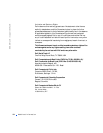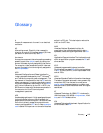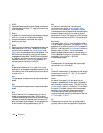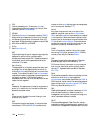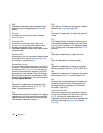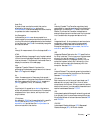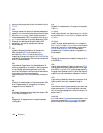
256 Glossary
www.dell.com | support.dell.com
ATAPI
Advanced Technology Attachment Packet Interface. An
interface used to connect CD, tape, and other drives
with a computer.
Binary
A system of numbers having 2 as its base and using 0
and 1 for its notation. Binary code is used by
computers because it works well with digital
electronics and logic.
BIOS
Basic input/output system. Composed of software and
data stored on a ROM chip. The BIOS initializes
communication between the microprocessor and
devices such as the keyboard and video adapter. The
BIOS also controls system functions such as error
messages and beep codes. The BIOS can be updated,
or "flashed," which can correct errors, support new
hardware, and so on. System setup allows you to
configure certain options in the BIOS.
Bit
A shortened reference to binary digit. A bit is the
smallest unit of storage and represents a quantity that
can have only one of two possible values, such as true
or false, or 0 or 1.
bps
Bits per second. A measurement of data transmission
speed.
Bps
Bytes per second. A measurement of data transmission
speed.
BTU
British Thermal Unit. A measurement of thermal
energy that equals approximately 1055 joules (or
1055 watt-seconds), or the amount of thermal energy
necessary to raise the temperature of one pound of
pure liquid water by one degree F at the temperature
at which water has its greatest density (39 °F).
Bus
An electronic pathway that links computer
components such as the microprocessor, RAM,
expansion cards, and so on. The "width" of a bus
indicates the amount of data that can move along the
bus and is determined by the number of parallel
conductors in the bus. For example, a 32-bit bus has
32 conductors and can move 32 bits of data at once.
Bus Speed
The speed, given in MHz, that indicates how fast a
bus can transfer information. For example, PCI bus
speeds are 33 or 66 MHz, and the AGP bus speed is
66 MHz. Intel Pentium® microprocessors have bus
speeds of 66 or 100 MHz. The microprocessor
operating speed is determined by a combination of
the bus speed and multiplier; for example, 100 MHz
bus speed x 4.5 multiplier = 450 MHz
microprocessor speed.
Byte
A measurement of data storage that equals eight
contiguous bits of information.
C
Celsius. A measurement of temperature that equals
the conversion formula (Tf - 32) * (5 / 9), where Tf
equals temperature in F.
Cache
An area of high-speed RAM set aside to store
frequently accessed data. When data is accessed, a
copy is stored in cache memory. The next time the
microprocessor looks for information, it first checks
the cache. If the data is there, the microprocessor
retrieves it from the much-faster cache memory.
Drive caching and RAM caching significantly
improve the overall speed of the computer. See also
L1 Cache and L2 Cache.
CD
Compact disc. An optical form of storage media,
typically used for audio and application programs.







